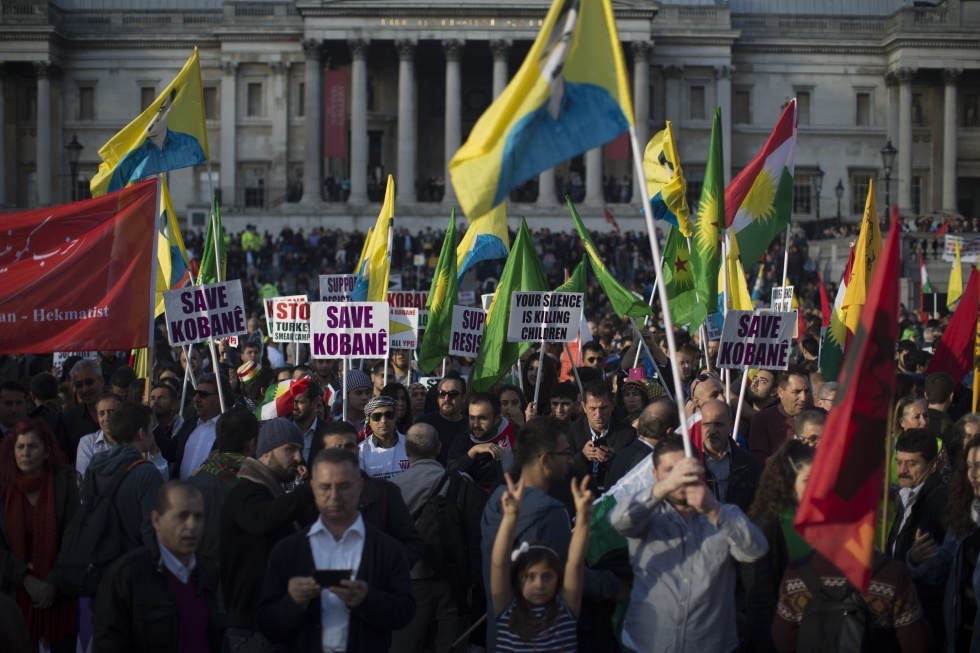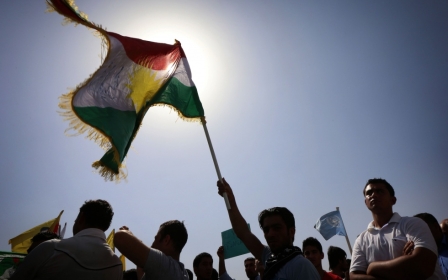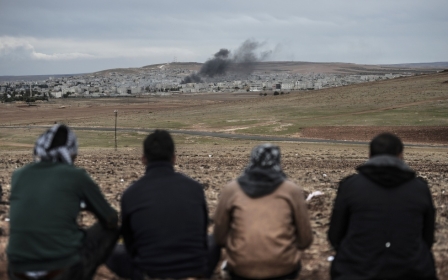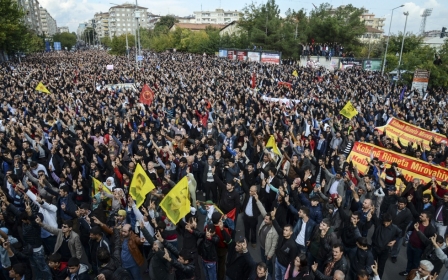Kurds worried war crime accusations could ruin Kurdish image

AMSTERDAM - For the first time, the image of the Western-supported Iraqi Kurds has been damaged after a Dutch TV station report eported on possible war crimes in their battle against the militant group the Islamic State (IS).
Dutch national TV programme Nieuwsuur reported on 24 October that Kurds have possibly executed prisoners of war and destroyed Arab houses out of revenge for Arab support for IS.
In the past, accusations of human rights violations have mostly been leveled against Iraqi government forces and the Islamic State. Last Thursday, Human Rights Watch said gunmen from IS executed 600 male prisoners in the province of Mosul this summer.
The mixed Arab-Kurdish areas previously taken over by IS and now recaptured by the Kurdish Peshmerga are posing serious dilemmas for the Kurdistan Regional Government (KRG) in Iraq, with an already large Arab community living in the Kurdistan region of Iraq.
The Kurdish regional government will soon issue a press release to clarify its stance on human rights issues, said a KRG official.
In the report, the Dutch-Kurdish commander of the Kurdish People’s Defence Force, Serdar Dosky, a former member of the Dutch Socialist Party, is heard saying the Kurds do not take prisoners of war, but kill them.
“We give them the bullet. A bullet costs 50 cents. We give them a second bullet to get rid of them,” he told the reporter Jan Eikelboom, under the assumption the TV camera had stopped recording. But his voice was still being recorded, and the Dutch reporter decided it was too important not to report what Dosky said.
“So you are not taking prisoners?” Eikelboom asks Dosky. “Ah, no, not in my forces, nowhere actually. Let’s be honest - simply nowhere. We don’t want prisoners.”
Dosky, who was active for the Socialist Party (SP) in the Netherlands before he left Holland for Kurdistan in 2005, says his comments were meant as a joke.
Harry van Bommel, an MP for the Socialist Party, and Michiel Servaes from the Dutch Labour Party asked questions in parliament about the allegations, and requested that the Dutch government put pressure on the Kurds to investigate possible human rights violations.
Van Bommel, a friend of Dosky, says he asked the questions to change the image that is now prevailing in the Netherlands that Kurds execute prisoners of war.
“The parliamentary questions were asked because Serdar Dosky tried to convince me that what he said is not true, and that he only tried to act tough. It is important that an objective party can establish the facts,” van Bommel told Middle East Eye.
The Dutch MP thinks the report damaged the image of the Kurds. “I have talked myself to Fazel Mirani [a Kurdish official]. He is very angry at Serdar. They are trying to do everything to correct the image.”
The Dutch public prosecutor Bart den Hartigh told NPO Radio 1 last Friday that they will possibly investigate Dosky for war crimes if the allegations are proven. But he noted it would be difficult to send people to the war zone to investigate. “It is not safe to send people there,” den Hartigh told the Dutch radio station.
Moreover, the report suggests that the Arab village of Barzan (west of Zummar, which was captured one week ago) was completely destroyed by Peshmerga forces in a revenge attack for the killing of Peshmerga prisoners by the villagers.
Dellawar Ajgeiy, the representative of the Iraqi Kurdish regional government in the European Union, denied the allegations. “We believe this is not correct and we have ISIS fighters as our prisoners, and they are treated according to the Geneva conventions, and it has never been our policy to kill any prisoner of war,” he told Middle East Eye.
Moreover, he denied that the Kurds destroy Arab villages, suggesting the destruction of the houses is the result of the IS militants planting IEDs and explosives in civilian houses. The Iraqi Kurds are receiving training from the British government to detect and defuse explosions.
“It is more important to protect the life of civilians than houses,” Ajgeiy said. “Revenge has never been part of our culture and history,” he said, pointing out the treatment of captured Iraqi army soldiers in 2003, despite the genocidal policies of the Iraqi government against the Kurds in the 1980s.
The report by the Dutch TV station led to angry reactions among Dutch Kurds against the programme. In general, the Western media has reported positively on the Kurds and their fight against the Islamic State, the main enemy of the West.
Now some Kurds worry it will hurt the image of the Kurds in the West. “With limited proof, the heavy claim endangers the image of the Peshmerga forces, glueing a stigma onto them that could potentially disrupt the international coalition at a sensitive time,” said Erbil-based Dutch-Kurdish filmmaker Beri Shalmashi.
“People are angry we report because they have the idea we are on the side of the IS and try to hurt the image of Kurds,” Eikelboom told Middle East Eye. “That’s not the intention. We report the facts and people should decide themselves what they think.”
On 29 October, the Kurdistan region president Masoud Barzani met with Erbil-based diplomats from the countries that support the international coalition against IS, assuring them that “despite the brutality of IS, Peshmerga forces are committed to the principles of war, human rights and protecting civilians,’ Rudaw reported.
Human rights organisations such as Human Rights Watch and Amnesty International could not comment on the allegations of the execution of war prisoners, since they had not investigated them.
“The fact for now is that there aren’t enough leads to even be able to investigate,” said Donatella Rovera, a senior crisis response adviser for Amnesty International, about alleged executions.
But she says there is proof for the destruction of the village of Barzan, also known as Barzanke, after visiting the village on Thursday.
“The Peshmerga were very clear that the villagers, who are Arab Sunni Muslims, will not be returning, and the scale of the destruction will indeed make it impossible for them to return as virtually every single house has been destroyed or damaged beyond repair,” she told Middle East Eye.
“Such practices could constitute war crimes and it is imperative that the KRG act without delay to ensure that such abuses will not be repeated in other areas which may be retaken by the Peshmerga. They must ensure that the wanton destruction in Barzanke is investigated and those responsible be held accountable,” she emphasised.
Amnesty called on the Western countries supporting the Peshmerga to “put in place the necessary oversight mechanisms to ensure the conduct of the Peshmerga complies with international humanitarian law (the laws of war).”
The KRG says Western countries and organisations are welcome to investigate the allegations and that they will brief the coalition forces on the allegations.
“There is no evidence for what they talked about on the TV channel,” said the KRG’s Ajgeiy. But he confirmed that it might negatively affect public opinion in Western countries.
“But the countries that are there [in Iraq] know exactly what is going on, and because of that they are not going to change their policy to support Kurdish Peshmergas, who are fighting on behalf of the free world, human rights and minorities in Iraq and the Kurdistan region,” he concluded.
New MEE newsletter: Jerusalem Dispatch
Sign up to get the latest insights and analysis on Israel-Palestine, alongside Turkey Unpacked and other MEE newsletters
Middle East Eye delivers independent and unrivalled coverage and analysis of the Middle East, North Africa and beyond. To learn more about republishing this content and the associated fees, please fill out this form. More about MEE can be found here.




